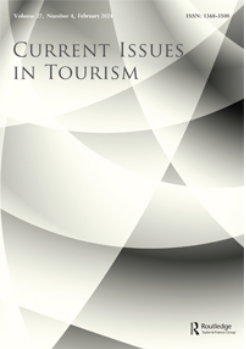How to calculate privacy: privacy concerns and service robots’ use intention in hospitality
IF 4.6
3区 管理学
Q1 HOSPITALITY, LEISURE, SPORT & TOURISM
引用次数: 0
Abstract
ABSTRACTArtificial intelligence in hospitality is increasingly transforming the way we travel. Service robots collect, store, analyze, and act upon a continuous stream of private information as a by-product of human-robot interaction. As such, they invade consumers’ virtual and physical space and raise privacy challenges in AI settings. We conduct a survey study(n = 576) and validate a mediating contextualized model of consumers’ adoption decisions on service robots in hospitality from privacy concerns. Our findings highlight the interplay between perceived risk and perceived benefit in shaping service robots’ adoption decisions is partially mediated by privacy concerns. Our findings also highlight the mechanism of privacy concerns, conceptualized as psychological constructs of collection, control and awareness of privacy practices, as an important addition to the established multiple chain mediating effect. The insights explain how consumers calculate privacy between perceived risk and benefit, and help reconcile a fundamental tension among consumers, how to avail benefits of privacy by improving the privacy awareness and control associated with the collection of private information in hospitality.KEYWORDS: Privacy concernsprivacy calculushuman-robot interactionservice robotsperceived riskperceived benefit Disclosure statementNo potential conflict of interest was reported by the author(s).Additional informationFundingThis work was supported by National Natural Science Foundation of China: [grant no 72074053]; National Social Science Fund of China.如何计算隐私:隐私问题与服务机器人在酒店业的使用意图
酒店业的人工智能正日益改变着我们的旅行方式。作为人机交互的副产品,服务机器人收集、存储、分析并对连续的私人信息流采取行动。因此,它们侵犯了消费者的虚拟和物理空间,并在人工智能环境中提出了隐私挑战。我们进行了一项调查研究(n = 576),并验证了一个中介情境化模型,该模型反映了消费者出于隐私考虑而对酒店服务机器人的采用决策。我们的研究结果强调,在决定服务机器人的采用决策时,感知风险和感知收益之间的相互作用部分受到隐私问题的影响。我们的研究结果还强调了隐私关注的机制,将其概念化为隐私行为的收集、控制和意识的心理结构,作为已建立的多链中介效应的重要补充。这些见解解释了消费者如何在感知风险和收益之间计算隐私,并有助于调和消费者之间的基本紧张关系,即如何通过提高与酒店私人信息收集相关的隐私意识和控制来利用隐私的好处。关键词:隐私问题隐私计算人机交互服务机器人感知风险感知利益披露声明作者未报告潜在的利益冲突。本研究由国家自然科学基金资助:[批准号:72074053];国家社科基金。
本文章由计算机程序翻译,如有差异,请以英文原文为准。
求助全文
约1分钟内获得全文
求助全文
来源期刊

Current Issues in Tourism
HOSPITALITY, LEISURE, SPORT & TOURISM-
CiteScore
15.50
自引率
10.00%
发文量
230
期刊介绍:
Journal metrics are valuable for readers and authors in selecting a publication venue. However, it's crucial to understand that relying on any single metric provides only a partial perspective on a journal's quality and impact. Recognizing the limitations of each metric is essential, and they should never be considered in isolation. Instead, metrics should complement qualitative reviews, serving as a supportive tool rather than a replacement. This approach ensures a more comprehensive evaluation of a journal's overall quality and significance, as exemplified in Current Issues in Tourism.
 求助内容:
求助内容: 应助结果提醒方式:
应助结果提醒方式:


